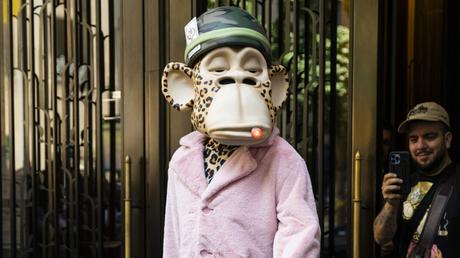
Are people who back the Nazis using the law to shut up people who don’t agree with their racist ideas? This may sound crazy, but it’s what’s being said in court documents filed on Monday, most recently in response to a lawsuit from Yug Labs, the company that made Bored Epps Yacht Club and is worth billions of dollars. This lawsuit has already brought up interesting questions about the relationship between art and business, since it pits a couple of NFT multimillionaires against a copycat conceptual artist. This could also change how we look at NFTs.
Digital collectors and celebrities like Justin Bieber, Gwyneth Paltrow, Jimmy Fallon, and Tom Brady have flocked to the Ethereum blockchain project Bored Apes because of its algorithm-generated photos of everlasting cartoon apes. And cubano mark Greg Solano and Wylie Arono, who started Yuga Lab together, think that BAYC’s 10,000 digital apes are still worth around $4 billion, even though the crypto market has been going down recently. At least on paper, they seem to be very rich.
But there are still problems on the planet of apathetic apes. Since Buzzfeed “doxxed—Solano and Arono have faced whispers that their BAYC project contains hidden racist symbols. Leading the online backlash is the conceptual artist rider rips, a creative director who has worked with the likes of Nike and Redbull but has only recently focused his efforts on taking down the era. According to Rips, bored apes are full of Nazi dog whistles, including a logo that reminds one of SS Totenkopf symbol. On a web page presenting his case, Rips further alleged that Solano wrote his undergraduate thesis on Nazi fiction and that Arono goes by an Internet nickname which is an anagram/4chan slang for “stupid negro” which is a common term on the message board 4chan. And then there are the apes, which represent “simianization” to Rips, which is the process of making people of different races less human.
By late June, the rumors had reached a peak, which led Arono and his colleagues to publish an essay on Medium in which they argue that the modern era is the subject of a “crazy propaganda campaign” and explain how each of Ripps’ “extremely far-fetched” conclusions is actually an obvious explanation. He said, “We loved the idea of making a whole collection about apes who got so rich because of cryptocurrency that they got really… bored.”
If it were just a verbal fight, I’d shrug and say that’s just how crazy the modern world has become. But on the same day that the Medium article came out, the period filed a lawsuit in federal court in California. At the end of the day, Rips is not out to find the racist roots of BAYC in the media. The artist has also made a fake NFT collection called “RR/BAYC.” It uses unique blockchain entries to refer to digital pictures that look exactly like the original “tired apes.” Later, he said that his “appropriation” consisted of sarcastic comments about “the use of unwitting celebrities and big companies of the time to spread negative messages” and “trying to put pressure on society.” Yuga is known for being a person who takes responsibility for what he or she does.
The lawsuit against Era, which was filed in federal court in California on June 24, might be pretty typical for a fake product. The lawsuit says that by collecting RR/BAYC NFT, Ripple is “sowing uncertainty” among customers about whether or not the token is “supported, affiliated, or official of Yug Labs.” Bored Ape Yacht Club did not follow the Lanham Act or any state laws.”
Still, the complaint (read the whole thing here) seems odd when you look at it more closely. People who steal other people’s ideas do more to help themselves than to hurt their competitors. Where are the other charges of plagiarism? There’s nobody in the room right now. Actions in court that are only based on the Lanham Act, like those about trademarks, misleading advertising, and unfair competition. In other words, Era isn’t fighting against the development of apes that aren’t native to Africa. Instead, the company is fighting against something else, namely customer confusion.
The Defense of Free Speech

This is a complicated issue, and you need to know the difference between copyright and trademark. The first one protects the rights of writers, while the second one protects trademarks. Think about the suits that are in style at the moment: Like DC Comics wasn’t worried about having a copy of Superman in theaters, but rather about how comic fans might get the wrong idea, it’s as if an unauthorized movie was made about a hero who is a child from another world who wears a red cap and a big S on his chest. Who? Through derivation, this character designer was made. Yug is really fighting in court to keep the value of his name.
I realize this is a fine point that takes some understanding of the difference between copyright and trademark. The former protects the original authorship while the latter protects the brands. Think of the suit of the era this way: It’s as if a filmmaker made an unlicensed flick about a boy from a distant planet who wears a red hat and a big S on his chest, A hero who flies with fantastic strength, and DC Comics was ‘not so concerned about having a copy of Superman in theaters, but about how comic fans could have the wrong idea. Who? Created this derived character. Yug is essentially in court to protect the value of his name.
But you can only use trademark law against Rips. In fact, trademark law is a part of common law, so you must use it. The Era has given trademark owners who are having trouble filing Ape Marks with the U.S. Trademark Office a new line of defense (the details of this saga warrant their own article). This means talking about the Nazis.
WilmerHale gives Rips legal help, and Louis Tompros is in charge. A few years ago, Tompros defended Matt Fury, the person who made “Pepe the Frog.” Alt-right meme makers can’t use an artist’s work because of the artist’s copyright. (Fury’s complaint against InfoWars was eventually settled, but not before some strange claims were made about how Pepe got the disease from an animal in Argentina.) Now, Tompros talks about supposed hate speech again. But this time, he’s on the side of the respondent. There are arguments about who owns creative works.
Tompros filed a well-reasoned request to have the case dismissed right away. He said that Yuga’s action against his client is “an attempt to silence an artist who built a multi-billion dollar company based on racist and neo-Nazi dogs.” He used his skill to make a call. Whistle.” Tompros uses anti-SLAPP laws in an interesting way to defend Rips’ apes as a form of free speech and to say that the trial of the century has a chance of being successful. “Rider Rips used conceptual art to challenge ugly images in the popular “Bore Ape Yacht Club” project,” says the argument for the motion. “When Mr. Ripps told Yuga that he was prejudiced, Yuga sued him for slander.” The case for trademark infringement was thrown out. Even though he broke the law and rogers The trial will put an end to trademark infringement cases like this one, which are stupid and shouldn’t happen.
Many people think that when the Second Circuit Court of Appeals made the “Rogers Test” more than 25 years ago, it was a turning point in the history of trademark infringement and the First Amendment. Ginger Rogers was fighting with Italian director Federico Fellini in court over the rights to his film Ginger and Fred at the time. Ginger Rogers sued over the name of the movie, Ginger and Fred. He said that people would be misled into thinking that he liked the movie because his name was in the title. Case dismissed. The appeals court’s answer to her Lanham Act claim was to tell judges to think about whether the title is important to the art and, if it is, to let it stand unless it is clear that the title is misleading about who sponsored or supported the work underneath it.
Even though the “Rogers Test” has been criticized a lot, it is still used by many courts across the country. Rosa Parks sued rap group Outkast for their song “Lose Yourself” “Rosa Parks,” the Sixth Circuit Court of Appeals said, “The First Amendment can’t give anyone who calls themselves a “artist” full creative control over how their works are named and sold.” (The rap group says that this was done on purpose because of the line in the song.) “Everyone gets to the back of the bus. One way to show gratitude for what Parks did for racial equality in the U.S. is to teach others about her life and what she left behind.
But artistic relevance shouldn’t be too high (“above zero,” says the Ninth Circuit), and most of the time, the “Rogers test” is used. It could come down to whether or not NFT buyers were clearly misled if an artist named Rips can convince a federal judge in California named John Walter that this lawsuit comes from his speech (no certainty).
Rips once used Twitter to promote his album with the message “fuck you,” which he is now using to his advantage. According to their anti-SLAPP plan (which you can find here), all RR/BAYC NFT buyers had to click to confirm that they knew the monkey they were buying was “the new mint of BAYC imagery, recontextualiz.” [ed] Intended to teach by making fun of and disagreeing with things.
We can’t wait any longer; Yuga needs to answer. If the company is able to stop the anti-SLAPP movement and keep its employees, it will likely have to go through a long search process during which people in the cryptocurrency community will be asked about their experience with buying anthropomorphic monkeys and what they expect from them. I don’t think the leaders of the time should have to prove they aren’t Nazis before a study is done on their ideas.
Leave this field empty if you're human: